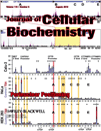
DNA AND CELL BIOLOGY
Scope & Guideline
Illuminating the Path of Cellular Advancements
Introduction
Aims and Scopes
- Molecular Mechanisms of Disease:
Research focusing on the molecular underpinnings of diseases, including cancer, neurodegenerative diseases, and infections, highlighting pathways that could serve as therapeutic targets. - Regulatory Roles of Non-Coding RNAs:
Investigations into the functions of non-coding RNAs, such as microRNAs and long non-coding RNAs, in gene regulation, cellular processes, and their implications in various diseases. - Cellular Signaling Pathways:
Studies exploring the intricate signaling pathways that regulate cell behavior, including proliferation, differentiation, and apoptosis, particularly in the context of cancer and other diseases. - Stem Cell Biology and Regenerative Medicine:
Research on stem cells, their differentiation, and potential therapeutic applications in regenerative medicine, focusing on their role in tissue repair and disease modeling. - Genetic and Epigenetic Regulation:
Exploration of genetic variations, epigenetic modifications, and their impacts on gene expression and cellular function, contributing to our understanding of complex traits and diseases. - Impact of Environmental Factors on Cellular Processes:
Studies examining how external factors, such as diet, toxins, and pathogens, influence cellular mechanisms and contribute to disease progression.
Trending and Emerging
- Ferroptosis and Regulatory Mechanisms:
There is a growing interest in ferroptosis, a regulated form of cell death, and its implications in cancer and other diseases, suggesting its potential as a therapeutic target. - Microbiome and Disease Interactions:
Research focusing on the microbiome's role in health and disease is gaining traction, emphasizing its importance in understanding complex interactions that influence disease outcomes. - Immune Modulation and Cancer Therapy:
Emerging studies are increasingly exploring the interplay between immune responses and cancer therapies, particularly the role of immune checkpoints and the tumor microenvironment. - Advanced Genomic and Transcriptomic Techniques:
The application of next-generation sequencing and transcriptomic analyses is on the rise, facilitating deeper insights into gene regulation and expression patterns associated with various diseases. - Personalized and Precision Medicine Approaches:
There is a notable trend towards personalized medicine, with research focusing on tailoring treatments based on individual genetic and molecular profiles, particularly in oncology.
Declining or Waning
- Traditional Pharmacological Studies:
Research centered on classical pharmacological approaches appears to be waning, possibly due to the increasing emphasis on personalized medicine and targeted therapies. - Basic Virology Studies:
The focus on basic virology without translational implications seems to be decreasing, as researchers lean towards studies that directly inform therapeutic strategies, especially in the context of emerging viral threats. - In vitro Studies without Clinical Relevance:
There has been a noticeable decline in studies that do not bridge the gap between in vitro findings and clinical applications, reflecting a broader trend towards translational research.
Similar Journals

CRITICAL REVIEWS IN EUKARYOTIC GENE EXPRESSION
Elevating Critical Discourse in Gene ExpressionCRITICAL REVIEWS IN EUKARYOTIC GENE EXPRESSION, published by BEGELL HOUSE INC, serves as a vital resource within the fields of Genetics and Molecular Biology. With the ISSN 1045-4403 and E-ISSN 2162-6502, this journal has been contributing to scientific discourse since 1990 and is projected to continue its publication until 2024. Despite its classification in the Q3 quartile for both Genetics and Molecular Biology, its impact on the research community is significant, as evidenced by its diverse range of critical reviews that synthesize and analyze emerging trends and foundational studies in gene expression. The journal, located in the United States at 50 North St, Danbury, CT 06810, offers a platform for researchers, professionals, and students to engage with innovative ideas and methodologies that drive forward the understanding of gene regulatory mechanisms in eukaryotes. Although it currently does not offer open access, the journal's content remains crucial for those dedicated to advancing knowledge in the intricacies of genetic expression.

CELLULAR PHYSIOLOGY AND BIOCHEMISTRY
Connecting Researchers through Open Access ScholarshipCellular Physiology and Biochemistry is a premier Open Access journal published by the prestigious Cell Physiol Biochem Press GmbH & Co, dedicated to advancing research in the fields of physiology, biochemistry, and molecular biology. Since its inception in 1987 and transitioning to an Open Access model in 2013, the journal has established itself as a vital resource for the dissemination of high-quality research and reviews, showcasing innovative methodologies and groundbreaking findings in cellular processes. With an impressive ranking in the 2023 Scopus category as Q2 in Physiology and a robust percentile of 61, Cellular Physiology and Biochemistry is committed to fostering academic dialogue among researchers, professionals, and students alike. This journal not only provides unrestricted access to its articles, but also promotes the global sharing of knowledge, which is essential for the advancement of our understanding in these vital scientific areas. The journal's editorial team is dedicated to ensuring the highest standards of academic rigor and relevance, making it an indispensable addition to the libraries of those engaged in the life sciences.

CELLULAR & MOLECULAR BIOLOGY LETTERS
Bridging Gaps in Cellular Research for a Global AudienceCELLULAR & MOLECULAR BIOLOGY LETTERS, published by BMC, is a premier open-access journal dedicated to disseminating high-quality research in the fields of Biochemistry, Cell Biology, and Molecular Biology. Established in 1996, the journal has emerged as a leader in its domain, boasting an impressive Q1 ranking across three critical categories as of 2023, reflecting its significant impact within the scientific community. With an ISSN of 1425-8153 and an E-ISSN of 1689-1392, it offers accessible research findings to a global audience, having been open access since 2013. Situated in the United Kingdom, at CAMPUS, 4 CRINAN ST, LONDON N1 9XW, the journal continues to serve as a vital resource for researchers, professionals, and students, contributing to advancements in the understanding of cellular and molecular processes. By providing a platform for original research, reviews, and short communications, CELLULAR & MOLECULAR BIOLOGY LETTERS plays a crucial role in fostering dialogue and collaboration within the scientific community.

FASEB BioAdvances
Connecting Researchers Through Open Access ScienceFASEB BioAdvances, published by WILEY, is an esteemed open-access journal dedicated to advancing the fields of biochemistry, molecular biology, and physiology. Since its inception in 2019, the journal has rapidly established a significant presence within the academic community, boasting an impressive impact factor reflective of its Q2 and Q3 standings across various categories, including Biochemistry, Genetics and Molecular Biology, Cancer Research, Molecular Medicine, and Physiology. The journal aims to disseminate high-quality research and innovative findings to enhance the understanding of biological processes, making it a vital resource for researchers, professionals, and students alike. With its commitment to open access, FASEB BioAdvances ensures that groundbreaking research is available to a global audience, facilitating collaboration and exploration in these rapidly evolving scientific domains.

CELL RESEARCH
Connecting Research to Real-World ImpactCELL RESEARCH is a premier peer-reviewed journal dedicated to advancing the field of cell biology and molecular biology, published by SpringerNature. With an impressive impact factor and consistently ranking in the Q1 quartile for both cell biology and molecular biology, this journal serves as a pivotal resource for researchers, professionals, and students seeking to explore the latest discoveries and advancements in cellular mechanisms and their implications for health and disease. Since its inception in 1996, CELL RESEARCH has cultivated a distinguished reputation, currently boasting ranks in the top percentile of Scopus categories, reaffirming its influence and relevance to the scientific community. Although it is not an Open Access journal, its rigorous selection process ensures the publication of high-quality articles that contribute significantly to our understanding of life sciences. For those deeply engaged in the realms of biochemistry, genetics, and molecular biology, CELL RESEARCH is an essential conduit of innovative research and critical insights.

CELLULAR AND MOLECULAR BIOLOGY
Innovating Understanding in Molecular BiologyCellular and Molecular Biology is a prominent academic journal published by C M B ASSOC, specializing in the dynamic fields of cellular and molecular biology. Established in 1977, this journal has consistently aimed to disseminate groundbreaking research that contributes to our understanding of biochemical processes, cell dynamics, and molecular mechanisms governing life. With its ISSN 0145-5680 and E-ISSN 1165-158X, the journal plays a vital role in the exchange of innovative ideas, evidenced by its coverage of research from 1977 to 2024. Although currently categorized in the Q4 quartile for major disciplines such as Biochemistry and Cell Biology, it is dedicated to fostering the development of the field by welcoming submissions that challenge the conventional understanding and lead to novel insights. Researchers and academics looking to contribute to or stay updated in the rapidly evolving landscape of molecular biology will find this journal a valuable resource for connecting with a global community of scientists.

Cold Spring Harbor Perspectives in Biology
Connecting Research with Revolutionary Biological DiscoveriesCold Spring Harbor Perspectives in Biology is a prestigious academic journal published by COLD SPRING HARBOR LAB PRESS that serves as a vital resource in the fields of Biochemistry, Genetics, and Molecular Biology. With an impressive impact factor and categorized in the Q1 quartile for its contributions, this journal is renowned for curating comprehensive reviews that synthesize the latest advancements and ongoing research in these dynamic and interconnected disciplines. Since its inception in 2009, the journal has played a pivotal role in advancing scientific knowledge through high-quality articles that cater to researchers, professionals, and students alike. Although it operates on a traditional subscription model, its contributions are indispensable for those seeking to remain at the forefront of biological research and its myriad applications. With a commendable ranking of #19 out of 221 in general biochemistry, genetics, and molecular biology on Scopus, this journal ensures that its readers have access to cutting-edge insights and a rigorous academic discourse.

CELLULAR SIGNALLING
Exploring the Intricacies of Cell BiologyCELLULAR SIGNALLING, published by Elsevier Science Inc, is a premier journal within the realm of Cell Biology, boasting an impressive Q2 category ranking as of 2023. With an ISSN of 0898-6568 and an E-ISSN of 1873-3913, the journal has established itself as a critical platform for advancing the understanding of cellular mechanisms and signal transduction pathways since its inception in 1989. Covering a vast array of topics in Biochemistry, Genetics, and Molecular Biology, it ranks notably at 87 out of 285 in the Scopus list, placing it in the 69th percentile among its peers. The journal serves as an invaluable resource for researchers, professionals, and students seeking high-quality, impactful studies that drive forward the field of cellular biology. While it operates under traditional subscription access, its highlights include rigorous peer-reviewed articles, reviews, and insights that continue to shape current scientific discourse.

JOURNAL OF CELLULAR BIOCHEMISTRY
Fostering Excellence in Cellular Biochemistry ResearchJournal of Cellular Biochemistry is a premier academic journal dedicated to advancing the field of biochemistry and cellular biology. Published by Wiley, this influential journal has a significant impact factor that underscores its relevance and authority within the scientific community. With its ISSN 0730-2312 and E-ISSN 1097-4644, the journal has been on the frontier of research since its inception in 1982, and is expected to continue publishing cutting-edge studies through 2024. As evidenced by its ranking in the 2023 Scopus Quartiles, it holds a rank of Q2 in Biochemistry and Q3 in both Cell and Molecular Biology, placing it among the top tiers of scientific journals in these disciplines. The Journal of Cellular Biochemistry serves as a vital resource for researchers, professionals, and students alike, providing a platform for the dissemination of innovative ideas and findings that shape our understanding of cellular processes and biochemical pathways. Though it does not currently offer Open Access options, its robust peer-review process ensures that each publication meets the highest academic standards, thus solidifying its esteemed position in the landscape of biochemical research.

MOLECULAR AND CELLULAR BIOCHEMISTRY
Exploring Cellular Processes with PrecisionMOLECULAR AND CELLULAR BIOCHEMISTRY, an esteemed journal published by SPRINGER, serves as a prominent platform in the fields of biochemistry and molecular biology. With a history of dissemination since 1973, this journal has made significant contributions to the understanding of biochemical processes at the molecular level. The MOLECULAR AND CELLULAR BIOCHEMISTRY journal focuses on a myriad of topics including but not limited to cellular biochemistry, clinical biochemistry, and interdisciplinary approaches in medicine, boasting a commendable categorization in the 2023 Scopus ranks where it falls under Q3 in Cell Biology, Q2 in Clinical Biochemistry, Q1 in Medicine (miscellaneous), and Q2 in Molecular Biology. Although the journal is not open access, it provides access options through institutional subscriptions, making valuable research accessible to a wider audience. With its rigorous peer-review process and high impact within the scientific community, this journal aims to advance knowledge and stimulate exploration in biochemical research, making it essential reading for researchers, professionals, and students alike.